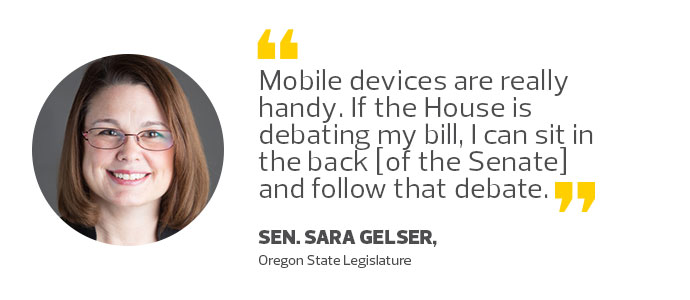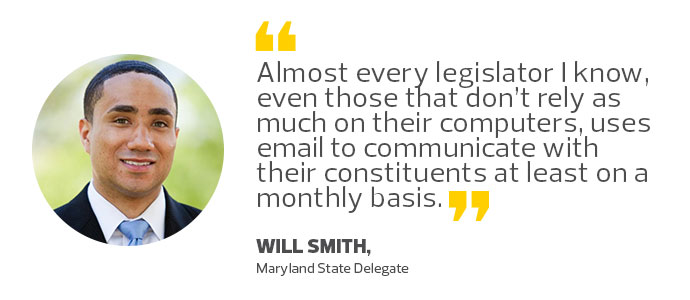Technology Plays Essential Role in Modern Legislature Process
When Oregon State Sen. Sara Gelser first came to the state legislature in 2005 (then as a member of the House of Representatives), she received paper copies of every bill and every amendment. Today, the legislature has gone almost entirely paperless.
“If you go into an Oregon hearing, every legislator has a laptop or tablet open in front of them,” Gelser says. “It’s great not to be lugging a giant bag around with me everywhere I go and wondering if I have the right file or brief. No matter what device I’m using, I can access pretty much everything, and that’s priceless.”
Florida State Sen. Oscar Braynon II estimates that he uses his Samsung Galaxy S7 and his iPhone 6s to talk, send emails and engage in social media between six and seven hours each day. “Maybe even more than that,” he says.
“Today’s legislator is fully connected,” says Maryland State Delegate Will Smith Jr. “You couldn’t do your job without social media or technology. Everything from the bills that I read to the way I communicate with my constituents, it all requires constant interface with [technology].”
People tend not to think of legislative types as hip early adopters of the latest tech. According to the National Conference of State Legislatures, the average age of state legislators across the country is 56, nearly a decade older than the adult U.S. population average — and more than two decades older than the hyper-connected millennials who are coming to dominate the workplace in other fields. Still, IT and mobility have become essential to the daily lives of state legislators around the country, allowing them to work on pending legislation, connect with their constituents and stay up-to-date about matters of policy and politics.
Technology’s Essential Role in Passing Legislation
Many states have adopted tech solutions that allow — or even require — legislators to file bills and amendments electronically.
“When you get a bill, or you’re tracking a bill, it’s all online,” Smith says. “If you want to read a bill that’s in committee, that’s all online. If you want to track committee votes, that’s all online. It’s completely digital.”
The Oregon Legislative Information System allows Gelser (and members of the public) to look up legislation by bill number, keyword or sponsor. Interested parties have access to the entire history of the bill, written materials considered by committees and even video files of hearings. The system also includes non-partisan analyses, such as economic impact reports.

The system allows Gelser to upload documents she’s received from constituents in support of, or in opposition to, pending legislation and tag them by bill number, allowing her to quickly pull them up on her laptop during Senate deliberations. Gelser even makes use of the system when she’s out of the building.
“If I’m going to a doctor’s appointment, in the car I will stream audio of a hearing that I’m missing,” she says. “It’s really fantastic.”
Technology Fuels Constituent Communications
“Almost every legislator I know, even those that don’t rely as much on their computers, uses email to communicate with their constituents at least on a monthly basis,” Smith says.
Braynon even uses email to keep a record of, and follow up on, face-to-face interactions with his constituents.
“If someone tells me they have a problem, I’ll write it down in an email,” he says. “As they’re talking, or as I walk away, I’ll write down the problem and email it to everyone on my staff and say, ‘Can someone take care of this?’ ”
Gelser manages her own inbox and uses email to send out regular newsletters. She even responds to her constituents when she’s on vacation. “It can be overwhelming,” she says. “But I don’t think you can ever have too much access to your elected leaders.”
Social media platforms have also become an increasingly valuable tool for legislators to reach out to receive feedback from the people they serve. “We have a joke,” Braynon says, “that if you don’t post it on Facebook, it didn’t happen. If you go to a homeowner association meeting or a chili-eating contest, if you don’t put it on Facebook and say, ‘I was happy to join a chili-eating contest out at the fair,’ it’s like you didn’t go.”
Smith regularly pushes out updates on bill debates and articles that quote him via Facebook and Twitter, which frequently results in (sometimes spirited) two-way communication.
Working with @SenatorDKelley and @CharlesSydnor3d at the @NCSLorg Juvenile Justice Policy Forum pic.twitter.com/gZPE5RV56V
— Delegate Will Smith (@Willcsmithjr) June 23, 2016
“If you put your opinion out there, you’re going to get instant feedback, and not all of it is positive,” Smith notes. But he allows the debate to unfold, rather than censoring comments and deleting those that are critical of him. “If you want something to be a dialogue or a discussion, you can’t filter even the negative feedback. It’s almost dishonest. Unless it’s profane or really offensive or there’s a threat of violence, I’ll keep it up.”
Connected Communications Drive Collaboration
Social media doesn’t just help legislators spread the word about bills and events. It also helps them to stay updated on what’s happening in their communities, their state and even the legislature itself.
“Twitter has made it easier to know what’s going on in other parts of the building,” Gelser says. “Mobile devices are really handy. If the House is debating my bill, I can sit in the back [of the Senate] and follow that debate.” Gelser also reads a number of news sources online — not just the websites of big newspapers, but also blogs focused on local issues.

Braynon uses social media to follow which candidates have reached signature thresholds to qualify for state legislative races, and he relies on mobile apps like the Florida Lobbyist Directory to make connections. “If I have an idea for something to do with grocery stores, I’ll look up who represents Walmart,” he says.
Gelser says that social media can also be a useful way to form bonds with colleagues, especially those across the partisan aisle. New state ethics laws have curtailed after-hours events that used to bring legislators together, Gelser says, and now Facebook and Instagram are helping to replicate some of that sense of community.
“That’s important,” Gelser says, “because you’re more likely to find common threads that you might not see on the House or the Senate floor.”









